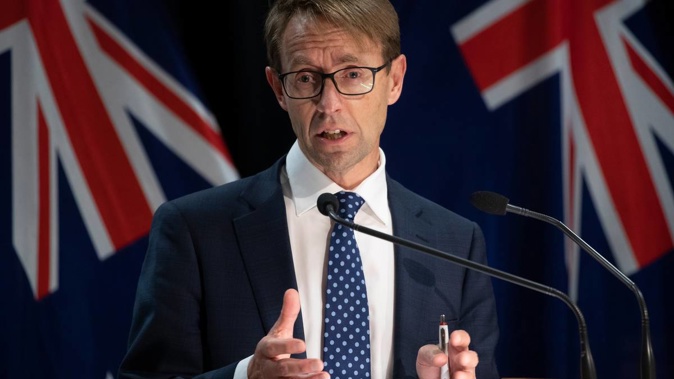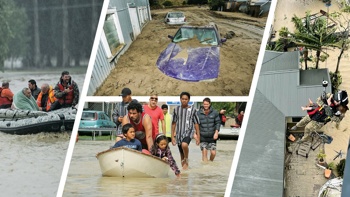
Dr Ashley Bloomfield says the Ministry of Health is adopting a "mixed strategy" in dealing with the different Covid variants, with elimination still the focus at the border.
It comes as the first case of the new and highly infectious Omicron variant was reported in MIQ on Thursday.
The director general of health says there are still many unknowns, but it is clear it is "very transmissable".
Omicron is currently ripping through Britain, with more than 88,000 cases reported on Thursday, setting a new daily record, and a top health official is warning the worst is yet to come.
In South Africa, where some of the first cases of the new variant were reported, there have been similarly high infection levels compared to previous variants, but so far lower rates of hospitalisation.
Early data appears to show while vaccines are less effective at preventing infection, they are almost as effective at preventing severe illness and death as with previous variants.
Early data also shows booster shots are crucial to retain efficacy, and Bloomfield is providing advice to ministers today on shortening the current six-month interval to boost protection.
The top health official has also not ruled out recommending regional lockdowns in case of any community outbreak, which are provided for in the traffic light framework.
Bloomfield told the Herald the ministry was watching closely the situations in Europe, in highly-vaccinated countries, and also Australia, which is in the same season.
The biggest unknown so far how was just how deadly this variant was, Bloomfield said.
"That's the one we probably know the least about. The next week or two, we'll start to see some better information coming through."
However, even if it proved to be less severe, based on the sheer numbers Omicron still posed a huge threat.
"The biggest driver of hospitalisation rates is not the severity of illness so much as the number of cases," Bloomfield said.
"Even if it's half or a third of the hospitalisation rate, if you've got 10 times as many cases you're going to have a lot of people in hospital."
There have been calls to delay the border reopening for fully vaccinated Kiwis coming from Australia from January 17 due to Omicron cases rising there.
Bloomfield said that would ultimately be a decision for ministers, but officials were watching closely the situation there ahead of a Cabinet review in early January.
In preparing for a potential Omicron outbreak, Bloomfield said they were operating a "mixed strategy", with elimination at the border for Omicron while handling the current Delta outbreak in the community.
"We've got a bit of a mixed strategy. We can eliminate at the border. We've had hundreds of Delta cases arrive in the country and one has got through but clearly we're still in a position where we've got those very strong border measures in place.
"We can still prevent Omicron coming in. And that seems a very sensible thing to keep pursuing, while we find out more about it."
The World Health Organisation has warned with the emergence of Omicron that vaccines alone won't stop it and urged continued protection measures including mask use and social distancing.
Bloomfield said that had long been New Zealand's approach, and ahead of summer testing capacity had been increasing along with contact tracing capability.
"We've already increased testing over the last few weeks, we'll do that even further. Our contact tracing where we've adapted to for Delta, we've increased our capacity there.
"And of course, we've moved to introduce a range of different ways to isolate people safely whether it's in managed isolation, we're of course at home being looked after by a range of services."
Bloomfield would be speaking today with ministers about booster shots and shortening the timeframe from six months, as currently approved by MedSafe.
"That third dose does give a really high level of protection. And also we want to be going into winter at maximum population immunity.
"We want everyone who's been double vaccinated to have had that booster ahead of winter."
The Delta outbreak, which took hold in more marginalised communities - including those with mental health issues and addictions, and those in transitional housing - had provided "huge lessons" for the ministry, Bloomfield said, which would be applied with Omicron.
According to data platform Tūtohi, only 72 per cent of the 120,000-odd people who engage with mental health or addiction services are fully vaccinated.
"We've learned a lot about how to get into those communities and work with them and get higher levels of tests and ensure that they can isolate safely."
On reaching 90 per cent
Bloomfield said the country had "achieved something significant" in cracking 90 per cent of the eligible population being double vaccinated.
"Early on everyone was talking 70 per cent, and thinking we'd be lucky if we got there. I told my team early on I had an ambition for a number and it's got a nine in it. That was early on and it seemed so far off."
Bloomfield said part of the success was building a programme that people trusted and providing opportunities in different ways.
"We're in this great position. And, you know, the Herald's been a huge champion of the vaccination programme and hitting that 90 per cent double vaccination this side of Christmas is a huge achievement."
On vaccines for 5 to 11-year-olds
Despite the overall high coverage there has been criticism the vaccine rollout was not equitable, and implicitly prioritised those who were more urban and wealthier.
MedSafe had now approved the vaccine for 5 to 11-year-olds, with Cabinet expected to approve it soon and the rollout to start in mid-January.
Bloomfield said there would not be the same constraints in terms of supply, meaning they could get vaccines out to Māori and Pacific providers immediately.
"We want to make sure we've got very specific initiatives going into Maori and Pacific communities, because I've actually seen when that does happen, we see really high rates," Bloomfield said.
Since more resources were given to such providers, Pacific rates have shot up and are now higher than Pākehā for first dose, meanwhile Māori have been getting vaccinated at the highest rate since the rollout opened to all ages on September 1.
Take your Radio, Podcasts and Music with you









